上海交大赵大海做客东方卫视演播室:北半球冬季到来加剧全球抗击新冠疫情的严峻形势
上海交通大学国际与公共事务学院教授、博士生导师,上海交通大学-耶鲁大学卫生政策联合研究中心执行主任赵大海,自新冠肺炎疫情暴发以来,对于新冠疫情暴发、防控以及卫生政策第46次接受上海电视台专访,也是第110次接受央视、上视专访。赵大海做客东方卫视演播室,在2021年11月14日的《环球交叉点》节目,就最近国内外的疫情暴发与防控态势进行了解释和评论,一同接受访谈的还有上海市疾控中心新冠防控现场组副组长潘浩以及华东师范大学教授余南平,现仅将关于赵大海的访谈内容摘录如下。
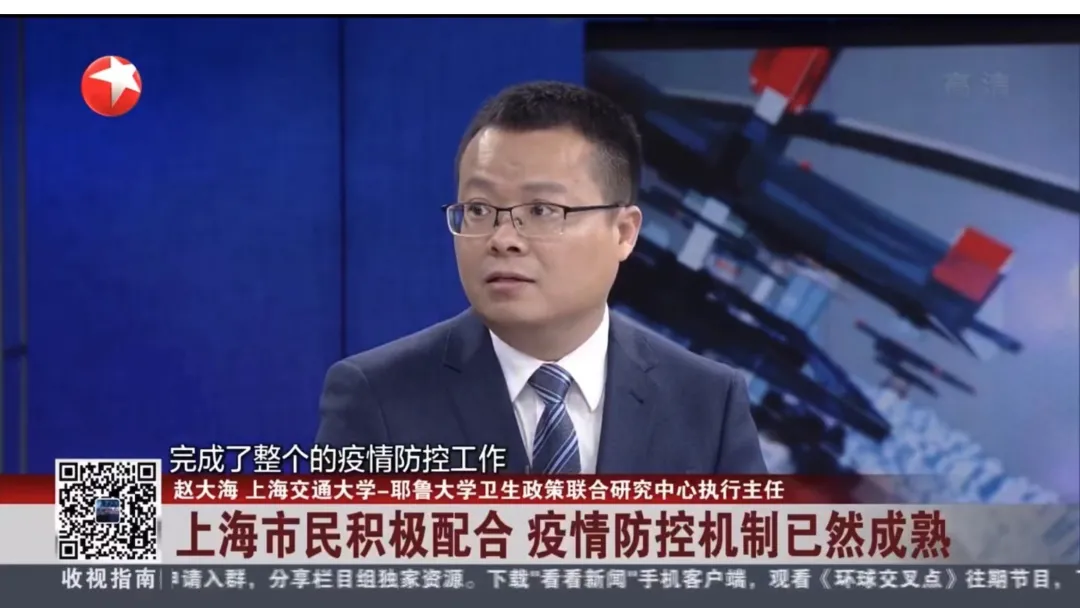
主持人:有没有发现这一次全国的散在疫情暴发,老年人的比例非常高,而且重症的比例似乎也是比较高,您怎么看这一次的疫情?
赵大海:这次的疫情,在特点上主要是两个方面,一个方面是通过所谓的中间媒介,即在旅途当中的旅行团传播。因此,一旦感染病毒,它就非常容易在全国造成扩散。另外一个方面,就是边境陆路口岸的疫情防控还是要格外重视。绝大部分的陆路边境口岸都处在一些经济欠发达,或者说是相对比较边远的地区,它的公共卫生保障能力、基础设施,包括捕捉密切接触者的信息技术的基础,相对就比较薄弱。这对于至少是在相对早发现新冠病毒的时间就会延迟一些;对整个疫情防控,还是带来比较大的不利。对于老年人的比例比较高,一方面是在非国定假期的时候,可能有一些老年人在气候相对比较好的时候,更愿意到外边去旅行;而对于我们新冠病毒的治疗方面而言,本身老年人的基础疾病相对比较多,病死率相对而言确实是要高一些。
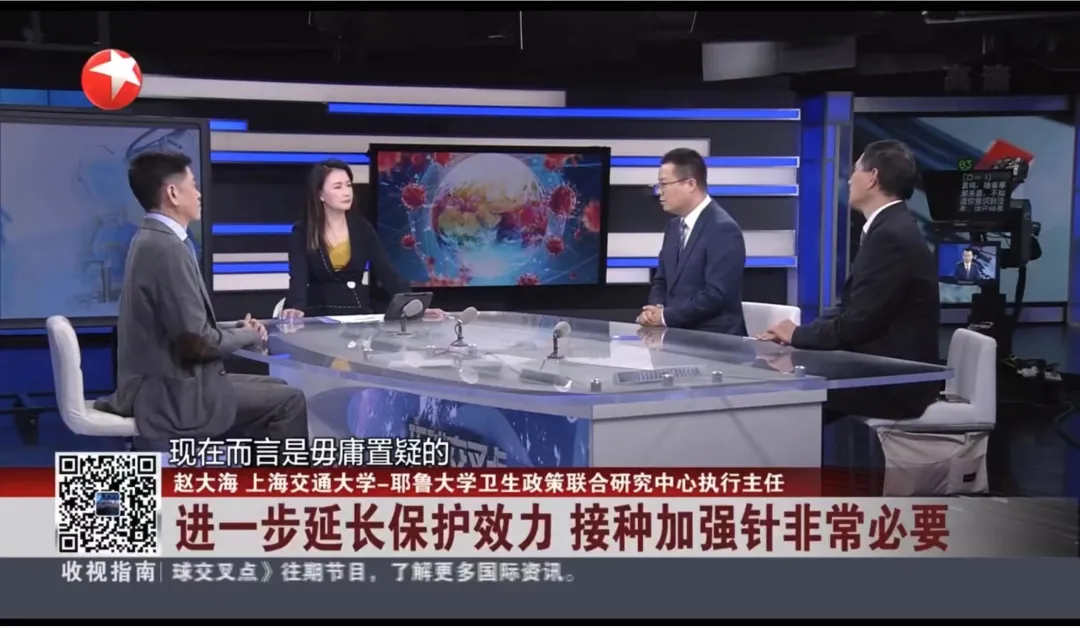
主持人:您从公共卫生政策的角度也来给我们分享一下,您怎么看这次迪士尼的疫情防控。上海的做法有些什么可圈可点之处?
赵大海:上海这次应对迪士尼的疫情防控,应该讲反映出了上海在疫情防控当中已经建立了一套科学的、精准的、标准化的疫情防控机制。因此,我们并没有过多的影响市民生活,而且我们也在非常高效率的前提下,完成了整个的疫情防控工作。当然了,刚才您提到的对于整个市民的配合而言,经过过去近两年的疫情抗击,我相信上海市民已经做到了“招之即来,来之即战”,就是说,只要我们收到相应的疫情防控协查,或者说需要我们市民配合的时候,上海市民都是做到了积极的、认真的、完全的配合。
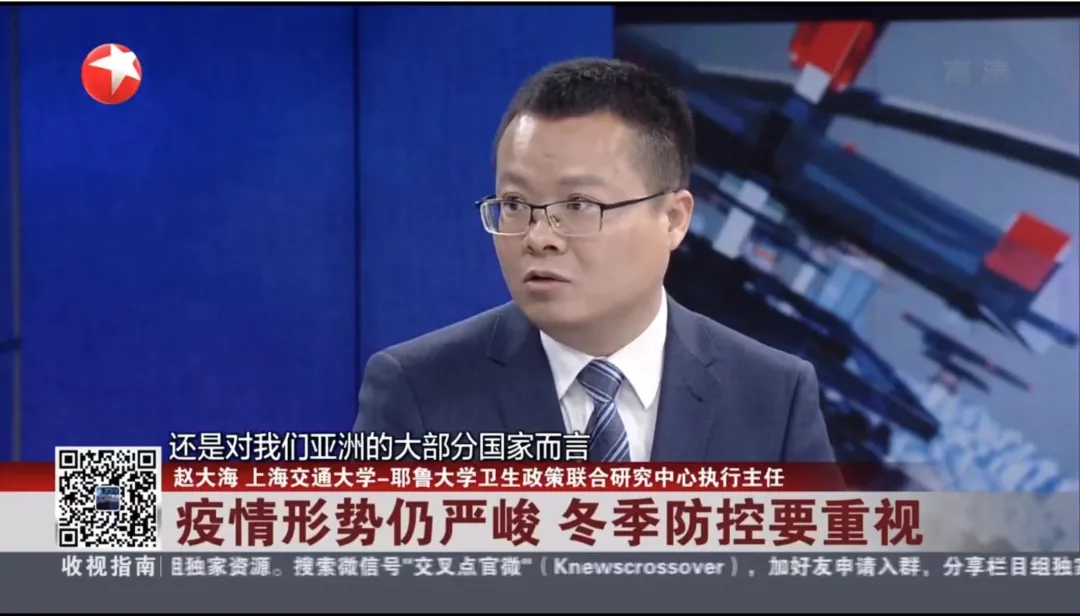
主持人:那么您怎么看第三针的加强针的必要性?
赵大海:首先加强针,它的必要性,应该讲现在而言是毋庸置疑的。原本中国在进行灭活疫苗研发的时候,我们本意就是两针的全程的免疫能保护大约一年左右的时间。然而,新冠病毒过了这么长时间还没有从地球上消失,因此,我们进行了后续的临床试验,而临床试验的结果发现,加强针之后,比如说灭活疫苗的第三针,在临床试验中能够进一步延长保护效力。因此从这个角度而言,第三针的加强针不仅是有必要的,而且是必须要接种的。
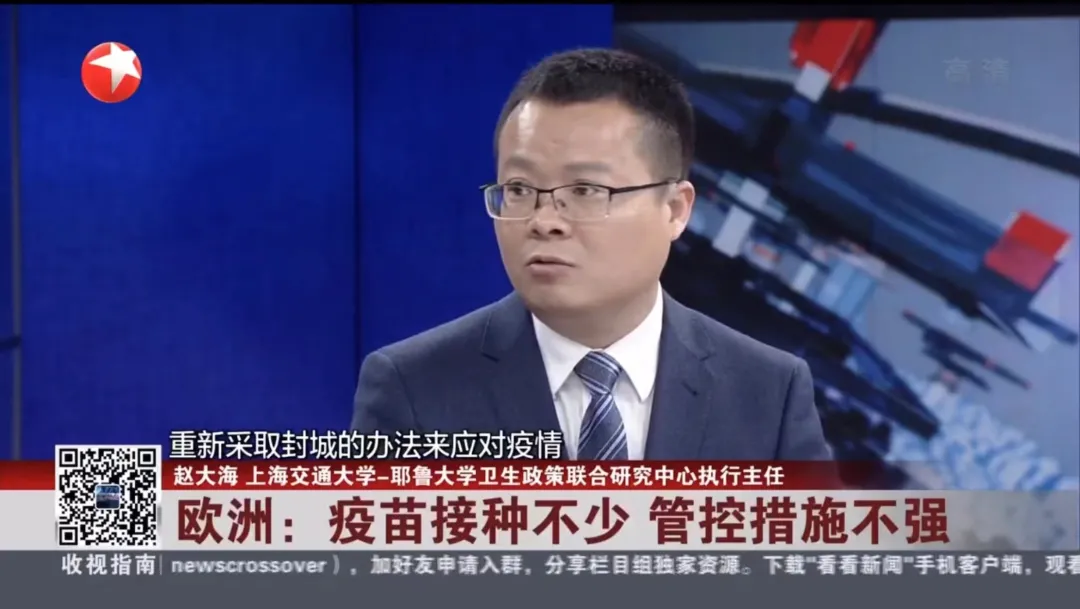
主持人:您觉得今年冬天会是一个相对比过去两个冬天更容易的一个冬天吗?
赵大海:首先我还是不敢太乐观。到目前为止,从每日的新增病例的情况来看,现在每天全球还在50万例左右,并没有明显的每日新增病例的下降趋势。而且现在欧洲几个主要国家,每天的新增病例还在2万左右,美国现在每日新增病例还超过10万。应该讲现在我们还没有一个充足的依据和理由,研判出今年的冬季到元旦之前,甚至是到2022年的上半年,有一个明显的下降趋势。应该讲,随着北半球冬季的到来,无论是北美、欧洲的大部分国家,还是包括我们亚洲的大部分国家,还是要做好面临严峻疫情防控形势的准备。
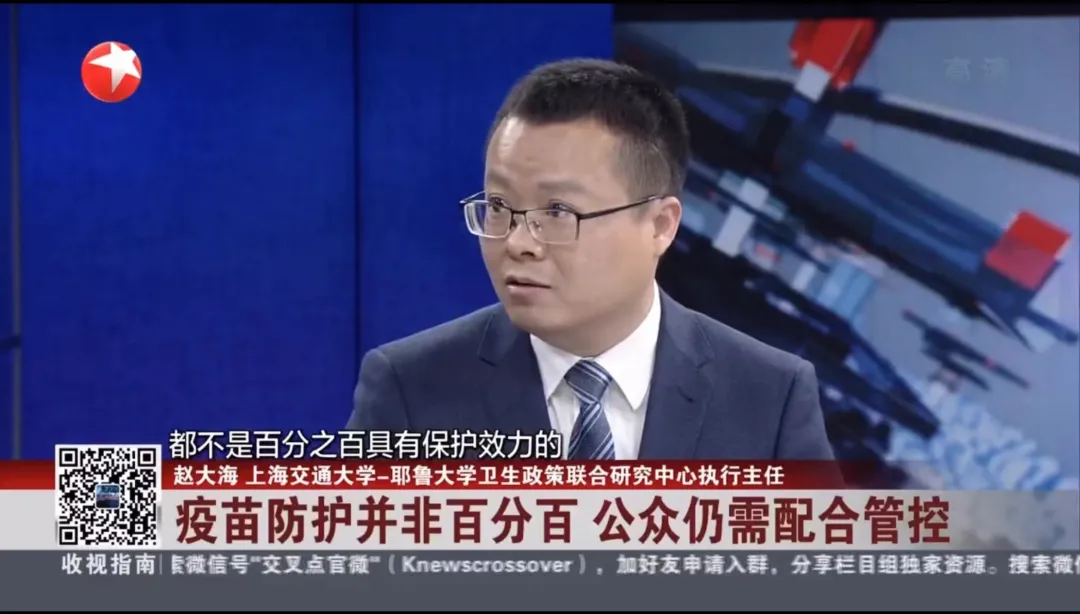
主持人:您还是比较谨慎和紧张的。确实我看到世界卫生组织也警告说,欧洲又再次成为了新冠疫情的“震中”。在过去的一周,欧洲区就有180万例的确诊病例,和2.4万人的死亡。无论从确诊数还是病死率,其实都是相当的高。但是专家认为欧洲主要是因为比较松懈,疫苗的接种率也不够高,这是欧洲疫情卷土重来的原因。欧洲是不是在面临一个毁灭性的冬天?
赵大海:说毁灭性的冬天,可能倒是有些夸张了。但是无论怎么样,即便是疫苗接种率相对比较高的一些欧洲国家,比如说英国,英国的疫苗接种率其实是不算低的,基本上已经达到了70%的接种标准,但是现在每天的新增病例连续几天还在两万多例。因此我们还是希望欧洲这些国家,能够采取除了依赖疫苗接种之外,还得进行一些其他的疫情管控措施。比如说,如果疫情再持续泛滥的话,不排除欧洲的一些国家重新采取封城的办法。
主持人:因为美国的疫苗接种率,特别是拜登政府上任以来,其实是非常快,也是非常高的,可是为什么疫情还是没有得到控制,而且我们看到美国的病死率,几乎也是全球最高的,到目前为止,75万例。
赵大海:是这样,首先美国的人口基数相对是比较大的,超过3亿的人口。另外一个很重要的一个原因就是,因为美国的新冠疫情长时期都比较严重,在很多州、很多地区,早就蔓延为社区传播了。在这个前提下,即便是部分的人接种了疫苗,基于底数很大,一直会有新的感染者出现。另外,新的统计数据,也在不断的精密,因此美国应该讲在元旦之前,每日新增病例数应该都不会太低。
主持人:所以美国在这一次的疫情防控方面,有哪些是值得我们大家吸取教训的地方?
赵大海:我觉得最大的可以吸取的教训,一方面,不能完全依赖新冠疫苗,毕竟新冠疫苗的防护效力,无论是哪一个国家研制的新冠疫苗,都不是百分百的具有保护效力。另外一个方面,公众还是要尽可能的配合政府的相对比较严格的管控的政策,只要新冠疫情没有得到根本性的控制,无论是政府还是社会组织,还是公众,都不可以完全掉以轻心。
主持人:给大家安全过冬提供一些什么样的建议?
赵大海:现在经过近两年的跟新冠的斗争经验,我们的老百姓,已经基本上掌握了如何来科学的防控新冠病毒,包括防控冬季的呼吸道的一些传染疾病,最重要的就是要严格的落实和执行我们的科学自我防控的政策。
供稿:国务学院
日期:2021年11月15日
Dahai ZHAO’s Exclusive Interview with ShanghaiTV: A global COVID threat intensified by the arrival of winter in the northern hemisphere
Dahai Zhao, a doctoral supervisor at the School of International and Public Affairs of Shanghai Jiao Tong University and Executive Director of Shanghai Jiao Tong University-Yale University Joint Research Center for Health Policy, has been interviewed by ShanghaiTV for the 46st time (the 110st time by CGTN / ShanghaiTV) since the COVID-19 pandemic. On November 14, 2021, Zhao commented on recent outbreak and containment at home and abroad on “Knewscrossover” of Shanghai TV.
Anchor: The proportion of elderly people in this sporadic outbreak is very high, and the proportion of severe cases seems to be quite high. What do you think of this outbreak?
ZHAO: This outbreak is characterized by two main aspects. One aspect is that it is spread through the so-called intermediary media, that is, among tour groups. So once you get the virus, it's very easy for it to spread across the country. On the other hand, special attention should be paid to epidemic prevention and control at border ports. The vast majority of land border ports are located in some economically underdeveloped and relatively remote areas, which have relatively weak infrastructure such as public health protection capacity, infrastructure and information technology to capture close contacts. This would delay at least the relatively early detection of COVID cases. All this has brought a relatively negative impact on the epidemic prevention and control. For the proportion of the elderly, on the one hand, some elderly people prefer to travel outside when the weather is relatively good during the Non-national holidays. As for the treatment of the elderly, there are many underlying diseases in the elderly, and the fatality rate is indeed higher.
Anchor: From the perspective of public health policy, what do you think of Disney's epidemic prevention and control? What are the merits of Shanghai's approach?
ZHAO: Shanghai's response to the epidemic prevention and control in Disneyland reflects that the city has established a scientific, accurate and standardized epidemic prevention and control mechanism. Therefore, we did not interfere with people's lives too much, and we completed the whole epidemic prevention and control work with high efficiency. Of course, as for the cooperation of the whole people, after the epidemic fight in the past two years, I believe that the Shanghai people have done "come at a moment's call, come at a moment's call". That is to say, whenever we receive relevant epidemic prevention and control assistance, or when we need the cooperation of the public, the Shanghai people are active, serious and fully cooperative.
Anchor: So what do you think about the need for a third dose of vaccine?
ZHAO: First of all, the need to the strengthening dose should be said now is beyond doubt. Originally, when China was developing the vaccine, our original intention was that the whole immunization with two injections could protect the vaccinated from being infected for about a year. However, novel Coronavirus has not disappeared from the earth after such a long time, so we have carried out follow-up clinical trials. The results of clinical trials showed that the third dose of the inactivated vaccine extended the protection further in clinical trials. Therefore, from this point of view, the third booster is necessary.
Anchor: Do you think this winter will be easier than the past two winters?
ZHAO: First of all, I still don't want to be too optimistic. So far, according to the daily new cases, the global daily new cases are still around 500,000, and there is no obvious downward trend in the daily new cases. And there are now around 20,000 new cases a day in major European countries, and more than 100,000 in the United States. It should be said that we do not have a sufficient basis and reason to judge that there is an obvious downward trend from this winter to the New Year's day, or even to the first half of 2022. With the arrival of winter in the Northern Hemisphere, most countries in North America, Europe and Asia should still be prepared for severe epidemic prevention and control.
Anchor: You are cautious. Indeed, I have seen the World Health Organization warning that Europe is once again the "epicenter" of the COVID-19 pandemic. In the past week, there were 1.8 million confirmed cases and 24,000 deaths in Europe. Both the number of confirmed cases and the fatality rate are actually quite high. But experts blame laxity and low vaccination rates in Europe for the resurgence. Is Europe facing a devastating winter?
ZHAO: The devastating winter, may be a bit exaggerated. However, even in some European countries with relatively high vaccination rates, such as The UK, the vaccination rate in the UK is not low, basically has reached the vaccination standard of 70%. But now the daily number of new cases has been more than 20,000 for several days. So we hope that countries in Europe, in addition to vaccination, will take some other measures to control the disease. For example, if the epidemic continues to spread, some Countries in Europe will not rule out re-lockdown measures.
Anchor: The vaccination rate in the United States is actually very speedy and very high, especially since the Biden Administration came into office. But why is the epidemic still not under control? And we see that the United States has almost the highest fatality rate in the world, 750,000 cases so far.
ZHAO: First of all, the population base of the United States is relatively large, more than 300 million people. Another important reason is that the outbreak in the United States has been severe for a long time. In many states and regions, community transmission has already occurred. Under this premise, even if some people are vaccinated, there will always be new infections due to the large base. In addition, new methods are being refined, so the number of new cases per day in the United States should not be too low until New Year's Day.
Anchor: So what are the lessons for us to learn from this outbreak in US?
ZHAO: I think the biggest lesson to be learned is, on the one hand, not to rely solely on the COVID-19 vaccine, which has limited protective efficacy. No matter which country develops the vaccine, it is not 100 percent protective. On the other hand, the public should cooperate with the government's relatively strict control policy as much as possible. Neither the government, social organizations nor the public should be completely complacent until the COVID-19 outbreak is fundamentally brought under control.
Anchor: What kind of suggestion do you have for the people to live through the winter safely?
ZHAO: Now, after nearly two years of fighting against the coronavirus, our people have basically mastered the scientific prevention and control of the Novel Coronavirus. Including the prevention and control of some respiratory infections in winter, the most important thing is to strictly implement and carry out our policy of scientific self-prevention and control.
Contributor: SIPA, SJTU
Date: November 15, 2021

